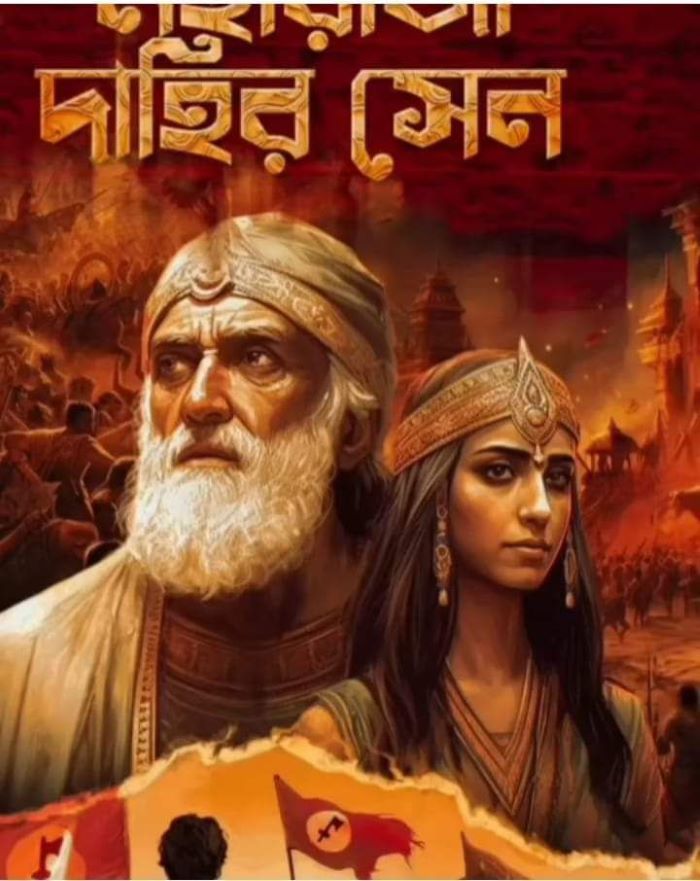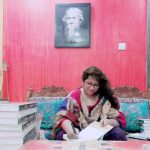
The English translation of a novel ‘Maharaja Dahir’ authored by Kolkata-based renowned novelist Debasree Chakraborti in Bengali language. The novel has been translated by Rajesh Giri
Dr. Iqbal finished his supper, now he cleaned the table, washed his hands and face and went to bed and started reading again.
Surya Devi writes, “Arab bandits have been eyeing our Sindh country for a long time. The security of Hindustan was based on our civilization, culture and religious foundation. They understood that only if they could break this barrier would their greatest victory be achieved. They were just waiting for an opportunity.
Once upon a time, an inauspicious cloud appeared in the western sky of Sindhu country, hundreds of thousands of black horses rushed towards Aror, blowing yellow dust, and the people of Sindhu became alarmed at the rhythm of clanging swords. Bani Asama, a warrior of a tribe of Arabs named Alafi, entered the political arena of Sindh country.
He killed a representative of the Caliph named Abdur Rahman, fled to Sindh with five hundred Arab warriors. My father’s policy was to help the helpless, so he sheltered Bani Asama. And the entire people of Sindh had to pay for this blunder. My father pursued Sadhana as indifferently as before, and conspiracies arose all around him. Some mysterious shadows starts to float in the heart of Sindh, whispers of conspiracy and laughter combined to compose a magic circle. During this time Parimal and I used to worship Mahadev every day, my father used to say that by worshiping Mahadev, the power of self-control increases and life become enriched. A girl from Rohri village used to supply our puja flowers, her name was Sheetal. All of Sheetal’s family served in the army of our Sindh country. She used to bring flowers every day and watch our puja, then eat prasad (connected food) and go back to his village. Our two sisters loved talking to her. She used to tell us about his village. The blue Indus river flows between the rugged yellow mountains, a small Shiva temple made of white stone by the river and their Rohri village on one side of the temple. I heard from her that her grandmother was a devotee of Mahadev, by her wish, her family established this Shiva temple. Sheetal was a very cheerful girl. One day when I went to give her prasad, I saw her sitting very upset.
 I have never seen her like this, so I was very worried, I sat in front of him and put my hand on her shoulder and asked, Sheetal, what happened to you? If you share your anxiety, the mind calms down, share your thoughts with me, you will get a lot of peace.
I have never seen her like this, so I was very worried, I sat in front of him and put my hand on her shoulder and asked, Sheetal, what happened to you? If you share your anxiety, the mind calms down, share your thoughts with me, you will get a lot of peace.
Once upon a time, an inauspicious cloud appeared in the western sky of Sindhu country, hundreds of thousands of black horses rushed towards Aror, blowing yellow dust, and the people of Sindhu became alarmed at the rhythm of clanging swords
Sheetal looked at me for a long time and said, Princess, all my thoughts are about your father. We are common people, we don’t have sense of intelligent judgment like you. But my grandmother says, Maharaj has fallen into their trap.
I could not understand anything of her at first. So I told her, “I don’t understand anything, please explain to me clearly.” Then she said, “My grandmother’s house was in Kikan of Sindh. They had a happy family with father, mother and two brothers. His father Pratap was a Jath warrior. Arab bandits had their eyes on their village for a long time. When they could not conquer Kikan after twenty years of continuous attacks, they resorted to deception. In these 20 years, they trick the citizens of Kikan and slowly took control of themselves, thus took refuge in the city of Kikan in disguise. Then in one night they attacked Kikan and destroyed the entire city. Only those who sheltered them survived, the rest were killed indiscriminately. No man, woman, child, or old man was alive.
I learned from her that her grandmother’s father, anticipating the attack, had given her a bag and hid in the basement under their house. He said that Kikan’s history is hidden in that pouch, this treasure she has to protect. If this city get destroyed, she must run away somewhere else with this bag. After the destruction of Kikan, her grandmother left the city in hiding.
While she was running perplexed away from the Kikan, father of Sheetal’s paternal grandfather was returning that way. He worked as a mercenary. He rescued her grandmother and gave shelter to her and later she married his son, Sheetal’s grandmother named her granddaughter Sheetal after her mother’s name.
Dr. Iqbal thought for a while, in the pages of history he read that in 712 AD Mohammad bin Kashem first invaded the country of Sindh. If this information written by Surya Devi is true, then Kikan was invaded and conquered by the Arabs long before this period. How falsehood is established by concealing the truth! If Kikan’s past is hidden in the bag given by Sheetal’s father, then it is possible to discover many unknown facts of history if the bag is somehow found out. But where is this bag hidden? Has Surya Devi written anything about this? Iqbal could not patient anymore, he started reading again.
Surya Devi wrote, I became very scared after hearing Sheetal’s narration that day. Knowing that Keekan’s past was kept secret by Sheetal’s family, I was curious to ask him how that past was hidden! How is it possible to conceal the past of territory simply in a bag!!
When I asked, she showed me our Mahadeva and said that Mahadeva is entrusted with the responsibility of protecting that terrible past.
Dr. Iqbal fell asleep while reading the diary of Surya Devi. He does not know how much time has passed since then. In his sleep he smelled chicken tikka, with chicken tikka there is sweet memory of Bapida, rehearsals and Delhi’s Karolbagh. On days when there was a twelve-hour long rehearsal, Bapida served hot tea and tikka. Sipping a cup of tea in the evening with tikka had a different taste, which made me forget the tiredness of the whole day’s rehearsals. Panchajanya is also feeling very tired while playing the role of Irfan. So maybe God was providing an end to his fatigue. As soon as the smell enters his nose, he woke up. Opening his eyes, he saw that the light was on in the living room outside, turning on the light of his mobile phone, he saw that it was eight o’clock at night. He came out and saw Abu Talib standing in front of the dining table wearing a black silk gown. Seeing Iqbal, he said with a smile, “I thought arranging everything on the dinner table I will call you. But an archaeologist is sleeping in Raqqa, Syria, this cannot be accepted at all. (Continues)
Click here for Part-I , Part-II, Part-III , Part-IV , Part-V , Part-VI , Part-VII, Part-VIII , Part-IX , Part-X, Part-X!
_________________
 Debasree Chakraborti is a renowned novel writer of Bengali language. Based in Kolkata, West Bengal, India, she has done Master’s in Modern History from the Kolkata University, and authored some thirty books, mostly the novels, with historical perspective and themes. Her most recent novel is ‘Maharaja Dahir’ that covers the history of Sindh from 662, the year of first attack on Sindh by the Arab armies till date.
Debasree Chakraborti is a renowned novel writer of Bengali language. Based in Kolkata, West Bengal, India, she has done Master’s in Modern History from the Kolkata University, and authored some thirty books, mostly the novels, with historical perspective and themes. Her most recent novel is ‘Maharaja Dahir’ that covers the history of Sindh from 662, the year of first attack on Sindh by the Arab armies till date.
 Rajesh Giri, born in Kolkata, had his early schooling from Kolkata and then from Medinipur—a village in Bengal. He graduated from Calcutta University with Physics and Maths and Master’s from Burdwan University in 2016. Now he is associated with Adhdhyaan educational institution teaching Physics. History enthusiastic Rajesh Giri is particularly interested in the ancient civilization of India and other regions like Egypt, Mesopotamia, and North America. He loves traveling.
Rajesh Giri, born in Kolkata, had his early schooling from Kolkata and then from Medinipur—a village in Bengal. He graduated from Calcutta University with Physics and Maths and Master’s from Burdwan University in 2016. Now he is associated with Adhdhyaan educational institution teaching Physics. History enthusiastic Rajesh Giri is particularly interested in the ancient civilization of India and other regions like Egypt, Mesopotamia, and North America. He loves traveling.